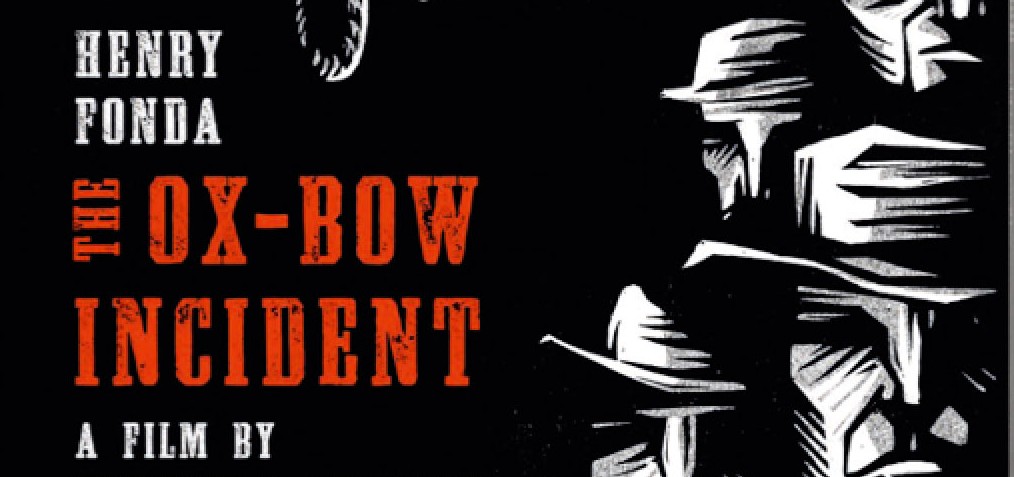
Disc Reviews
The Ox Bow Incident Blu-ray review

Westerns had, and for some still have a simplistic moral of good guys against bad guys and the frontier with its rules of engagement (or lack of) where the gun rules. These are still rules that hold sway in the USA today. Just look at the simplistic arguements of Donald Trump or prior to him George W. Bush. But almost single handedly The Ox Bow Incident, made in 1943 created a whole new set of rules in old West storytelling. Released by Arrow Video this is a long awaited DVD and Blu-ray release. And incidentally no gun shots are fired in the film.
The films opening tells us that the film is set in Nevada in 1885. Two rough trail hardened cowboys, Gil Carter and Art Croft (played by Henry Fonda and Henry Morgan) arrive at the trail town of Bridger’s Wells. While in the bar they overhear that a local rancher called Kincaid has been murdered and his cattle rustled. The sheriff is out of town when the locals whip up a posse especially on hearing that a group of men have been spotted with cattle on their way south. Led by a retired Major, who even rounds up the posse dressed in his old Confederate uniform, the two strangers reluctantly decide to join them for fear that suspicion will fall on them. One man, a town elder (Harry Davenport) warns them that their action is illegal and will not partake in the posse. The mob head out of town and eventually comes across their suspects: a senile old man, a Mexican (a young Anthony Quinn) and their trail leader (Dana Andrews). The posse are convinced they have their men and stack up the evidence against them: the cattle are Kincaid’s and they have no bill of sale, that they have Kincaid’s gun that they claim they found and that in his confusion the senile old man says that they did it. The men plead their innocence and seven of the posse including the two strangers, with Fonda proving to be the voice of right and reason before the posse lynch the men without a proper trial. The posse do allow the leader to write his last letter to his wife.
The Ox Bow Incident is a powerful drama, moodily shot by Arthur Miller and intelligently directed by William A, Wellman, who like other directors such as Raoul Walsh was a very macho director of macho themes. Slim in length at 77 minutes Wellman keeps the action and the dialogue tight marking this as what could be termed as the first psychological western that created a new sub-breed of westerns in the late 1940s and 50s which included the likes of Shane (1953). It could almost be called a noir western given the dark tones and theme of the film. Indeed many have criticised it for its artifice and obvious sets. Wellman wanted the film to be shot on a soundstage so he could have greater control of the lighting while the hill and tree silhoutted against the dawn skyline pre-empts the death drive towards the hanging. The script and dialogue by Lamar Trotto is tight too, adapted as it is from a novel by Walter Van Tilburg Clark which Fonda makes us well aware of in the trailer, one of the extras on the disc. It never lets the viewer forget that the drive of the story is about mob rule and the dangers of flouting the law in favour of the mob. There had been precedents to this, not least of all in Fritz Lang’s Fury (1936) and Wellman’s own The Conquerors (1932). But this is the best film on this theme and the most tightly made.
The disc comes complete with a few extras including an interesting 10 minute introduction setting its place in the history of westerns. Introduced by Peter Stanfield, author of ‘Hollywood, Westerns’ and the ‘1930s: The Lost Trail and Horse Opera: The Strange History of the Singing Cowboy’ who also narrates one of the two commentaries on the disc this sets the film iinto context with other westerns from the period. It is unfortnate that Stanfield at times stammers making the viewer lose the thread of the talk somewhat. Also included is a biographical documentary on Henry Fonda. The 4K digital restoration by 20th Century Fox on Blu-ray looks impressive giving sharper chiarascuro to the films dark black and white tones. Only the cover, looking somewhat like a German woodcut does not look representative of the film.
Chris Hick



